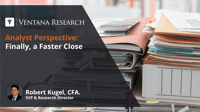Configure, price and quote (CPQ) software has been around for decades. Lately, I’ve been using the term “Dynamic CPQ” to apply to a variant of this software category that explicitly aims to produce a quote that optimizes the trade-off between the profitability of a deal and the probability of closing a sale. Dynamic CPQ software is a hybrid of price and revenue optimization (PRO) software and CPQ, providing companies with the ability to better execute their market share and pricing strategies....
Read More
Topics:
Customer Experience,
Office of Finance,
Data Preparation,
Information Management,
Sales Performance Management,
Financial Performance Management,
Price and Revenue Management,
robotic finance,
revenue and lease accounting,
sales enablement
The traditional office of finance has five main organs: accounting keeps the books; financial planning and analysis (FP&A) analyzes performance and manages the forward-looking activities of the company such as planning, budgeting and forecasting; corporate finance raises outside money; treasury takes care of the cash and bank accounts, and tax. The modern office of finance requires a sixth: Finance IT (FIT).
Read More
Topics:
Office of Finance,
Analytics,
Financial Performance Management,
Price and Revenue Management,
Digital Technology,
Operations & Supply Chain,
ERP and Continuous Accounting,
blockchain,
robotic finance,
Predictive Planning,
Conversational Computing,
revenue and lease accounting,
collaborative computing,
Subscription Management,
AI & Machine Learning
A quarter century ago the “fast, clean close” became a key measure of a finance and accounting department’s effectiveness. Since then there has been general agreement that companies should be able to close their books within a business week. Our research on the accounting close has consistently shown that companies with very similar characteristics (measured in terms of revenue, number of employees, location and industry) vary considerably in the number of days it takes them to complete their...
Read More
Topics:
Office of Finance,
Financial Performance Management,
ERP and Continuous Accounting,
robotic finance













